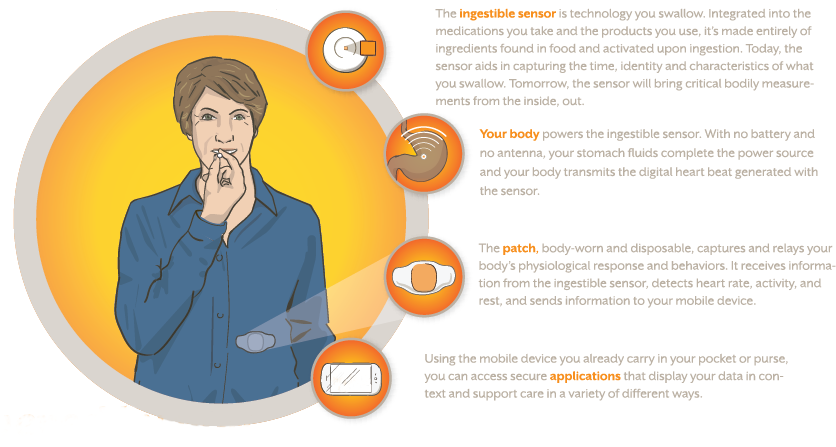#digital pill

Noncompliance in medicine is just fancy talk for “That patient doesn’t follow instructions very well.” And, for the most part, when a patient doesn’t do as they’re advised they generally think they’re “not hurting anybody but themselves”. Which is true, except when it’s not.
For example, patients with infected with tuberculosis (TB) that is resistant to multiple drugs often need to be treated foryears with very specific (and often times very expensive) medications. It’s important these particular patients stick closely to their medications because TB can be spread as easily as breathing in infected aerosolized droplets (those are the tiny balls of spit and what not that we all launch into the air every time we cough or sneeze!). What was “just one patient” can easily become a whole lot, all because some doofus decided he’d skip a day.
Digital Pills: The way these pills are said to work is simple, in theory. The microchip is roughly the size of a sand-particle and is made up of a tiny amount of silicon and even less magnesium and copper. Once swallowed, the chip would eventually reach the stomach- there the acid in your stomach would “activate” a small electrical signal and that small signal can then be picked up by your doctor with some sort of “scanner” on the skin over your belly (we’d venture to say Apple is probably working on an app for this as we speak).

As of now, the FDA, has only approved these microchips based on studies done using placebo drugs. Eventually, the makers of these chips hope to have them used in medicines that must be taken for years such as those for drug resistant tuberculosis, diabetes, and for the elderly with chronic diseases, according to the co-founder and chief medical officer of the company (Proteus Digital Health), Mr. George Savage (Mr. Savage, that’s really the guys name).
Mr. Savage’s take is that the point isn’t to have “Big-Brother” in you medicine cabinet, but rather “…to understand how people are responding to their treatments. This way doctors can prescribe a different dose or a different medicine if they learn that it’s not being taken appropriately.”
And, to be honest, he’s not completely full of hot-air. For example, if a patient is being prescribed Morphine for chronic pain and they are instead selling their pills to the neighbors, how would we as doctors know for sure? Or how about the patient who claims that their pills were in their check-in bag and the airline lost their bags? Now they need an ‘emergency refill’, when in fact they’ve downed all their months supply for the high? Both are very real scenarios, which are often the beginning of a prescription addiction/abuse story. It’d be great to have a way to confront a patient and say “Look, we know what’s going on, and we’re here to help before the problem gets out of hand.”
But, this story has too many openings for a great sci-fi movie or even better, a government conspiracy theory! Here are a few words that are all the fuel needed to have people worried (…and I can’t blame them, I mean who doesn’t love a good conspiracy theory?!):
- Silicone.
- Digestible microchip.
- Magnesium.
- Copper.
- Scanner.
….So for now, Mr. Savage, we’ll pass on this one.
